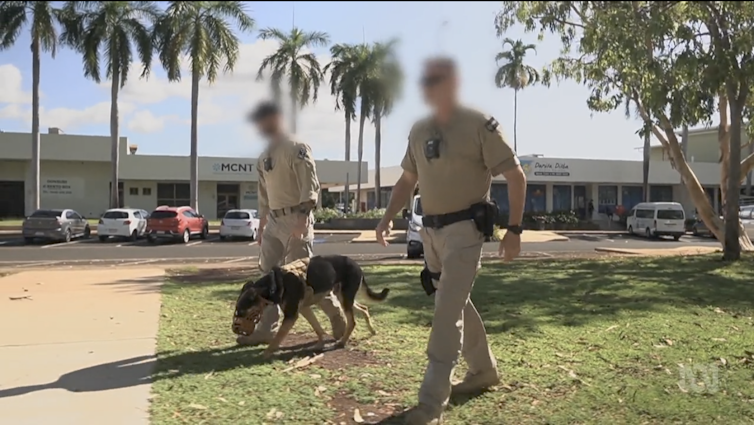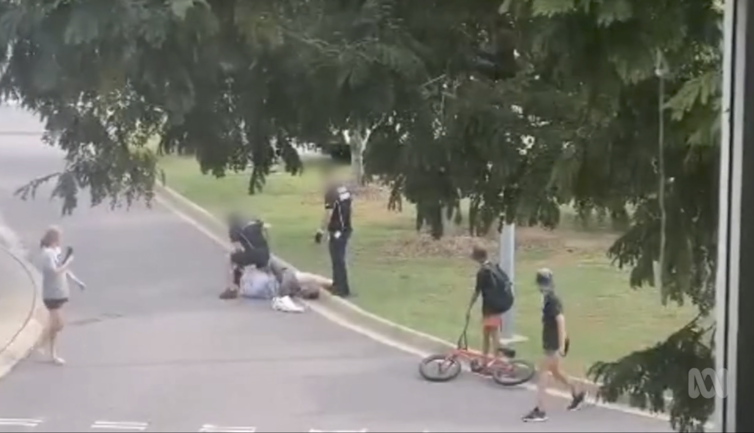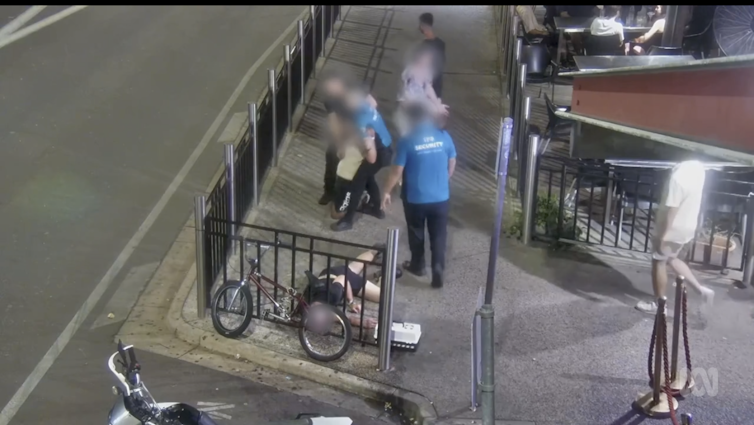ABC's Four Corners shows the dangers of private policing in the NT and why First Nations people are more at risk.
Aboriginal and Torres Strait Islander readers are advised this article contains names of deceased people and mentions of discrimination and violence against First Nations people.
The most recent ABC Four Corners episode, Guarded, investigates the increase of private policing and security in the Northern Territory. It also shows scenes of First Nations people being deprived of their liberty, searched and assaulted by private security.
The prevalence of private police in the Northern Territory is on the pretence that crime has increased, although statistics from the Australian Bureau of Statistics based on public safety surveys between 2005 and 2023 and police data show mixed trends.
Despite the large scale of this kind of policing in the NT, there is a lack of legislation controlling what powers and authority private security guards actually have. There is also a lack of legislation regulating their conduct and responsible use of force and weapons.
The 4 Corners program documents instances of First Nations women, men and children being moved on, manhandled and pushed to the ground for prolonged periods by private security. In one month alone, 283 people were moved on. First Nations rough sleepers were especially targeted as part of a street sweeping agenda. One First Nations man described being thrown to the ground so badly he couldn’t breathe.
The report showed in 2013, Yanyuwa and Garrwa man Mr King died from positional asphyxia after security guards pushed him to the floor face down for seven minutes, during which he screamed “I can’t breathe”. The coroner into Mr King’s death found the security guards had insufficient training to understand the risks of their work. The guards were acquitted of manslaughter in 2014.
Private policing in Australia
In 2023, the federal government and Northern Territory government announced $14.2 million in funding for additional police and private security, including ten security guards in public places in Alice Springs (Mparntwe), such as around youth centres.
Private police and security exercise enforcement roles, including apprehending, searching and detaining members of the public. In recent years across the country, the functions of private security have expanded from commercial and private spaces into patrolling public spaces, schools, transport platforms and interchanges, and on-board buses.
In the Northern Territory, private security patrols supplement the highest police-to-public ratio in the country.
This increase of private security in public spaces has not been accompanied with legislative authority to stipulate their powers. Rather, the increase of this mode of policing has transpired through government announcements and answers to questions in parliament in relation to their role.
 Recently, private security in the Northern Territory carry pepper spray and patrol with dogs. Screenshot from ABC Iview.
Recently, private security in the Northern Territory carry pepper spray and patrol with dogs. Screenshot from ABC Iview.
What’s happening in the Northern Territory
In Darwin (Garramilla), community lawyers have said that racism was evident in the operations by private security guards, noting their particular surveillance of First Nations people.
In Alice Springs, private security have taken a front-line role in the management of First Nations young people. In 2019, the Northern Territory government introduced its Breaking the Cycle of Youth Crime program, which included funding nightly security patrols operated by Talice Security throughout the CBD.
Doctoral research by Lora Chapman finds that in Alice Springs, private security patrols are “stand-ins for police” and make it difficult for First Nations young people to be free from surveillance. First Nations young people could not enter the weekly youth disco, for instance, without providing their names and addresses to security officers and being scanned by metal detectors. They were then locked in the disco, where Chapman described First Nations kids feeling under siege.
Private security guards in the Northern Territory also possess restricted weapons. In Alice Springs, private security transit officers and crowd controller licence holders can carry oleoresin capsicum spray (also known as “OC” or “pepper spray”), while lacking necessary training. This weapon can cause coughing fits, breathing difficulties and fatalities.
What are the risks of private policing?
There is no legal framework to restrain the power of private security guards, and the scope of their powers is completely obscure. The detail is often buried in contractual agreements or licences between private security contractors and the government.
It was shown on 4 Corners that people experiencing homelessness in Darwin submitted to the authority of security officers without being told of the scope of their powers.
When violence is inflicted by a Northern Territory security officer, the complaints procedure, at best, provides for the suspension of licences, rather than referrals to police. The 4 Corners program reported that many security officers shown in videos to be manhandling First Nations people were able to retain their licences.
In the NT, there is a private security act that seeks to regulate security services, but it only relates to the provision, review and suspension of licences, rather than the powers exercised by private security guards. When this act was first introduced to parliament, it was envisaged a legislative amendment would be required to address this. This has not yet occurred.
Police powers and authority are governed by legislation, which has been sorely tested by ongoing police assaults and deaths in police custody.
Governments need to not only better regulate policing and private security guards, they should also establish independent oversight of all policing. Governments should also consider alternatives to policing, such as Aboriginal night patrols that promote care and safety for community.
Profits before people
The privatisation of public order management and policing creates a law enforcement system driven by profits. Profits are a deterrent to investing in staff training, employing qualified guards and providing compliance systems. Providers in the Northern Territory, for instance, can meet the competency standards for a security officer within eight days.
Repeatedly on 4 Corners, First Nations people and security officers referred to the officers as “cheap police”. The commodification of public policing is based on cost efficiency, rather than a legislative framework and protection for the public.
The possession of weapons also opens the gates to unchecked violence. As the harms of Northern Territory policing mount, the focus should be on retracting rather than expanding the policing net.![]()
This article is republished from The Conversation under a Creative Commons license. Read the original article.



